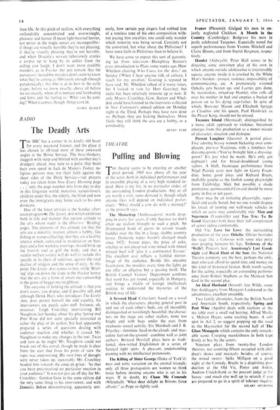RADIO
The Deadly Arts
THE BBC has a corner in its kindly old heart for every wayward listener, and the place it has chosen to off-load most of these awkward angles is the Home Service. The busy-thinkers, sluggish with sleep and blotted with another day's drudgery ahead, may tune to a pulse that beats their own speed in Jack de Manio's Today; re- ligious persons may test their faith against the sheer sides of the Daily Service—'our prayers today are taken from New Every Morning page . . .' only the page number stirs from day to day in this forgotten world; motorists, nature-lovers, children under five, the elderly, the blind and now even the immigrants may home each to his own dovecote.
One of the latest arrivals is the Sunday after- noon programme The Lively Arts which enshrines both in title and manner that current attitude to the arts whose nadir is the Observer 'Briefing' pages. The elements of this attitude are that the arts are a minority interest, almost a hobby, like fishing or stamp-collecting; that they are a healthy interest which, cultivated in moderation on Sun- days and a few weekday evenings, should brisk up the liverish soul as golf the body; and that a secular welfare society will do well to include this specific in its chest of sedatives, against the total decline of religion and the sense of duty. At this point The Lively Arts comes to rest, while 'Brief- ing' slips on down the slope in the blacker heresy that the arts are a form of smart one-upmanship in the game of beggar-my-neighbour.
The outcome of holding the attitude is that you don't assess, you display and if possible sell, and although Derek Hart, who introduces The Lively Arts, does permit himself the odd asperity, his interviewers are purely sales staff. Instance, oh, instance: Leigh Crutchley interviewing Bill Naughton last Sunday about his play Spring and Port Wine did not seem specially interested in either the play or its author, but had apparently prepared a series of questions dealing with audience reaction and whether it caused Mr. Naughton to make any changes in the text. Twist and turn as he might Mr. Naughton could not break out of this corral, though he made it clear from the start that from his point of view the topic was unpromising. His own lines of ;bought were never taken up, inexorably Mr. Crutchley headed him towards the coup de grace: 'So that you have preconceived no particular reaction in your audience?' It was not just an off day for Mr. Crutchley: Gordon Gow in the same edition did the very same thing to his interviewee; and with Dominic Behan demonstrating, apparently seri-
ously, how certain pop singers had robbed him of a tuneless tune of his own composition with- out paying him royalties, one could only wonder which minority was being served. Certainly not the converted, but what about the Philistines? I have more faith in Philistines than to believe it.
We have come to expect this sort of patronis- ing tat from television—Humphrey Burton's crass introduction to Plato some weeks ago, Huw Wheldon chairing Who Cares for the Arts? on Sunday ('When I hear anyone talk of culture, I reach for my revolver,' Goering is reputed to have said. Mr. Wheldon talked of it many times, but 1 looked in vain for Herr Goering), but radio has been relatively immune up to now. If only Messrs. Crutchley, Gow, Burton and Whel- don could have listened to the interviews collected in New Comment's annual edition on Monday night in the Third. Perhaps they have now done so. Perhaps they are kicking themselves. More likely they still think the arts are a hobby, or a commodity.
HENRY TUBE






























 Previous page
Previous page